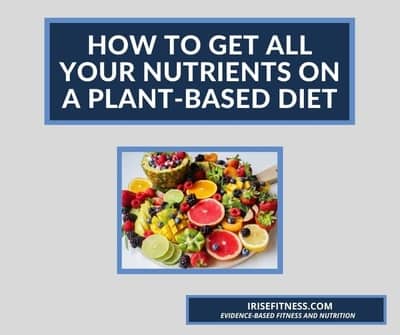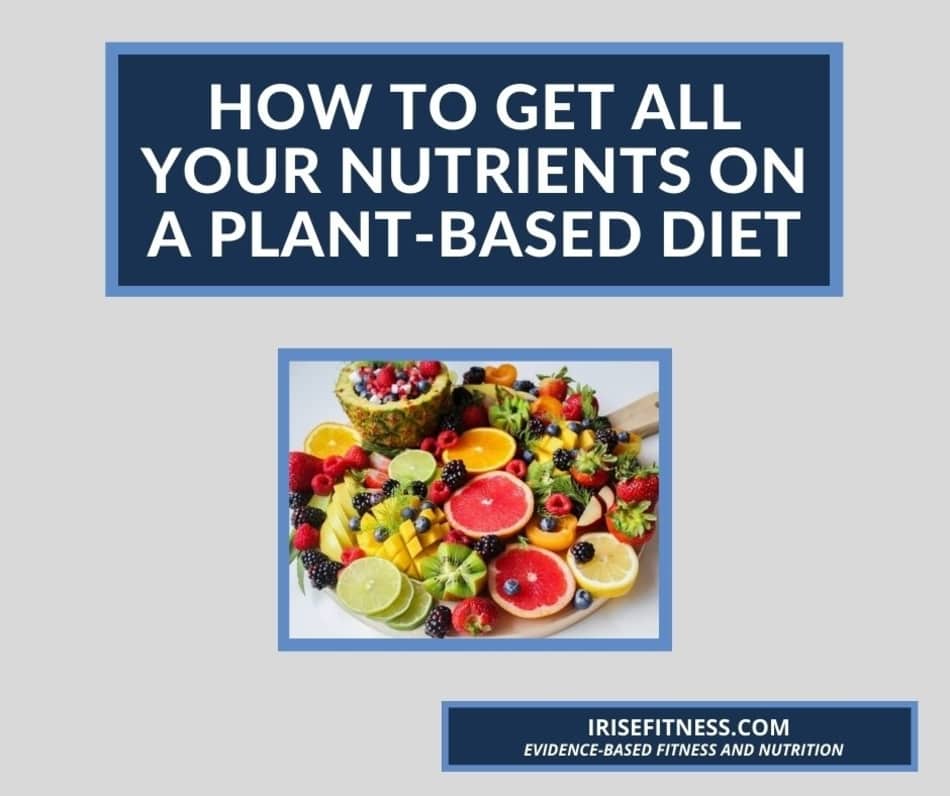
If you’re eating a plant-based diet, you are taking the best nutritional approach you can in order to reduce your chances of developing chronic disease and live a long, healthy life.
That being said, as with any nutritional plan, it is important to make sure that your diet includes all the nutrients your body needs.
With that in mind, I wrote this article to talk about the nutrients you need to be most aware of, and discuss how to make sure you’re getting all those nutrients while on a plant-based diet.
I will discuss 17 nutrients. However, the first 7 nutrients I cover are the most important ones to be aware of. The ones after that are obviously important, but require less monitoring to ensure you’re getting all you need.
At the end of the article, I provide you with a cheat sheet that will help you structure your diet so as to maximize the benefits of a plant-based diet .
“You have to be extra aware of getting all your nutrients on a plant-based diet”
Before I dive into this subject, I need to address the above statement. For many reasons I think it’s unfortunate when people make this assertion.
For one, people who eat a diet centered around plants, on average, have the greatest longevity (the research is quite clear on this). So why are we starting off the conversation about plant-based diets in a negative light? It makes no sense!
Second, 95+ percent of Americans don’t eat enough fiber, which is strongly correlated to health and longevity, so how can people be saying that “it’s hard to get all your nutrients on a plant-based diet?”
Lastly, it isn’t hard to get all your nutrients on a plant-based diet. Like any “diet,” people simply need to be educated on a few nutrients they should be mindful of. Once you become aware, it’s easy to get all the nutrients you need if you appropriately plan the way you eat. That’s it! Just a bit of information, which I am going to cover in this article.
Vitamin B12
I want to preface this by saying that vitamin B12 is the only nutrient that you need to supplement with. While you should consult your doctor, for adults under the age of 65, it is generally recommended to supplement with about 250 mcg of a cyanocobalamin spray per day. However, if you don’t like the idea of taking it every day or you’re afraid you’ll forget, you can take a tablet of 2500 mcg once per week, or get B12 injections from your doctor.
Adults 65+ might be able to benefit from as much as 1,000 mcg per day but again, consult your doctor about what might be the right dosage for you.
B12 is the only nutrient on the list that clearly requires supplementation because you will not consume enough B12 on a plant-based diet. All other supplements I talk about can be obtained through diet/sun. However, beyond B12 there are a few others that might be helpful to supplement.
If you want to read more about vitamin B12 and other supplements to consider taking, click here to access an article I’ve written on the topic.
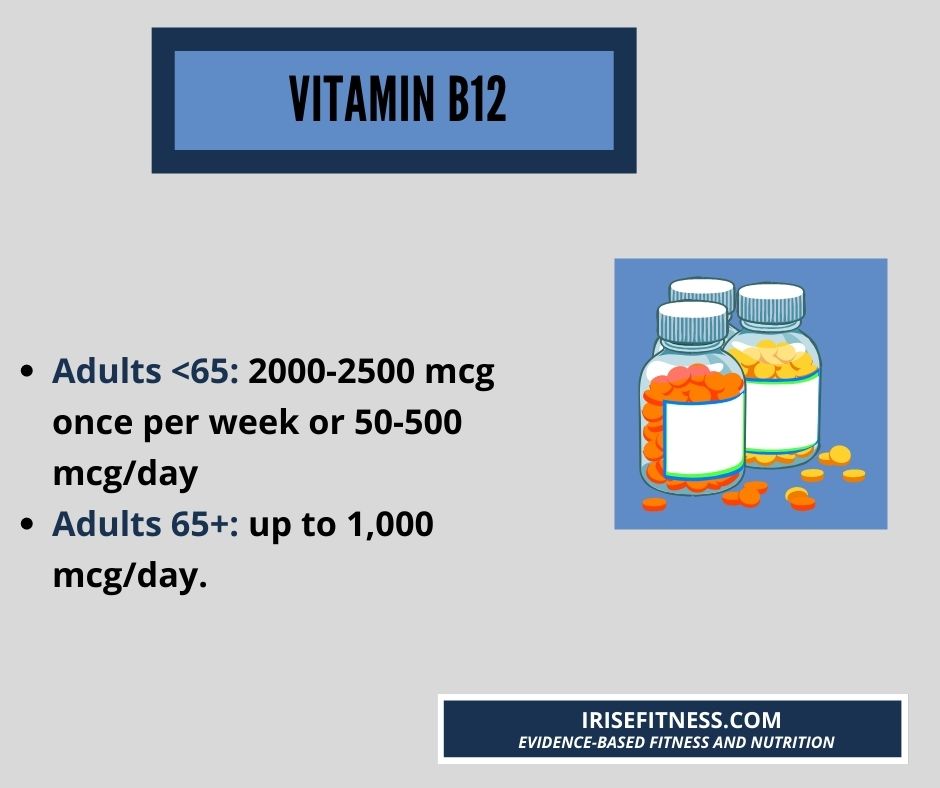
Calcium
Importance
Calcium is very important for building and maintaining strong bones. In addition, your heart, muscles, and nerves require calcium for proper function.
Calcium is one of the main nutrients that people think is hard to get on a plant-based diet because they’ve been told time and again that you need to eat dairy (or drink milk) in order to get your calcium.
It’s ironic that this myth has been perpetuated for so long because as seen in the examples below, you will eat enough calcium from plant foods as long as you eat a balanced, plant-based diet.
The recommended daily intake of calcium varies significantly depending on what source you look at. The World Health Organization says we should get between 400-500mg, whereas the USDA recommends around 1,000 mg. To be safe, I recommend eating somewhere in the middle range.
What foods are high in calcium?
- Soy: 4 ounces of firm tofu (120 calories) has 300 mg of calcium. 4 ounces of extra firm tofu (120 calories) has 420 mg.
- Legumes: A cup of beans has over 100 mg.
- Nuts: All nuts have some calcium. Almonds have a lot at about 100 mg per 200 calories.
- Seeds: 2 tbsp of chia/flax seeds contains around 50 mg. 2 tbsp of tahini (made from sesame seeds) contains 130 mg.
- Greens: 1/2 cup cooked spinach contains 120 mg. 1/2 cup cooked kale contains almost 100 mg.
Even grains and some fruits contain calcium. The sandwich bread I eat (Dave’s Killer Bread) has 70 mg per slice. An orange has 50+ mg.
Lastly, many plant milks are fortified with calcium so you can see how much is in the plant milk you drink.
You get the point.
As long as you eat a well balanced plant-based diet consisting of fruits, vegetables, legumes, grains nuts, and seeds, you will have no problem getting all the calcium you need.
Iodine
Importance
Iodine is a very important mineral that is needed for proper thyroid health. We only need trace amounts of iodine in our diet and its especially important if you are pregnant.
If you eat a plant-based diet, here are the top three ways you can get iodine in your diet:
What foods are high in Iodine?
- Dulse/Wakame flakes (2-3 tsp per day)
- Iodised Salt (about 1/2 tsp per day (150mcg) depending on the brand)
- Supplement: 150mcg for adults, 220mcg if pregnant, and 270mcg if breastfeeding
As you can see, getting enough iodine isn’t difficult – it’s just about picking one of these 3 options and sticking to it.
If you have an under active thyroid (i.e. Hashimotos), speak to your endocrinologist, dietician, or physician about what is right for you.
Iron
Importance
Iron is an important mineral that plays a crucial role in the transportation of oxygen throughout the body. Iron deficiency, known as anemia, includes symptoms, such as fatigue, weakness, shortness of breath, dizziness, irregular heartbeats, and more.
Unfortunately, iron is one of the most common vitamin deficiencies in the world. It mostly impacts women of childbearing age due to excess blood loss, but it can also impact people who simply aren’t eating enough iron rich foods.
It is often thought that people eating a plant-based diet are more likely to have an iron deficiency, but studies actually show the opposite findings. In addition to the fact that those on a plant-based diet tend to get more nutrients, such as vitamin C, that help with absorption of iron, according to this study looking at over 13,000 people, those who ate a vegetarian diet (no meat) consumed more iron than those eating a diet consisting of animal products.
There are two types of iron. Heme iron, which is only found in animal products, and non-heme iron, which is found in plants. Heme iron is more easily absorbed by the body, which tends to be the main argument people use to claim that it’s better to get your iron from animal products.
That said, what people don’t talk about are the risks associated with heme iron.
While this can be a topic for another article, heme iron puts you at an increased risk of developing certain chronic diseases, such as cancer and heart disease. Research shows that for every 1 milligram of heme iron consumed daily, which is equal less than one ounce of beef or chicken, you are at a 27% increased risk of developing coronary heart disease.
So the argument is pretty strong about how you should stay away from heme iron and stick with the non-heme iron in plants.
What foods are high in iron?
Because plant-based sources of iron are less digestible than meat sources, it is recommended that vegetarians and vegans get 1.8x the normal RDI (Recommended Daily Intake)
Adding vitamin C in the same meal as eating iron rich foods has been shown (through this study) to increase the bioavailability of iron by 3 times, which then exceeds the bioavailability of heme iron. So adding a bit of lemon, for example, on your dark leafy greens is a great option!
For reference:
- 1 cup of black beans is 50% of your daily requirement of iron
- 1 cup of lentils is 82%
- 1/2 a cup of cooked spinach is 40%
- 1/2 a cup of tofu has over 50%
It’s easy to see that as long as you are filling the majority of your diet with whole, plant-based foods, getting enough iron is not an issue!
Omega 3’s
Importance
Omega-3 fatty acids are important fats that provide many health benefits. There are 3 types of omega-3s: ALA, DHA, and EPA.
Most people think of getting omega-3s from fatty fish, such as salmon. However, omega-3 fatty acids are plant derived fats that come from algae in the ocean. If you get omega-3 from fish, it isn’t the fish that is making it – the fish are eating other creatures that eat the algae that contains the omega-3s.
The problem with getting your omega-3s strictly from fish and seafood is that they tend to be sponges for toxins within our oceans. Research clearly shows that fish contain high levels of pollutants and are among the major source of exposure humans have to Persistent Organic Pollutants (POPs), which are essentially toxic chemicals within our environment.
What foods are high in omega 3’s?
The top sources are flax seeds, chia seeds, hemp seeds, walnuts, and soybeans. These are plant-based foods that contain ALA.
For many people, 1.5 tablespoons of chia/ground flaxseeds each day is sufficient as your body will take the ALA and create all the EPA and DHA that you need. Make sure they’re ground as your body absorbs the nutrients better.
That said, as we age, our ability to make that conversion declines. So to be safe, omega 3’s is one of the few supplements that’s likely worth taking if you are older (250mg of an algae based EPA/DHA supplement should be sufficient, but make sure you discuss with your doctor).
Some ways to incorporate flax/chia/hemp seeds into your diet is to add them to a smoothie, oatmeal, salad, or whatever is most convenient for you.
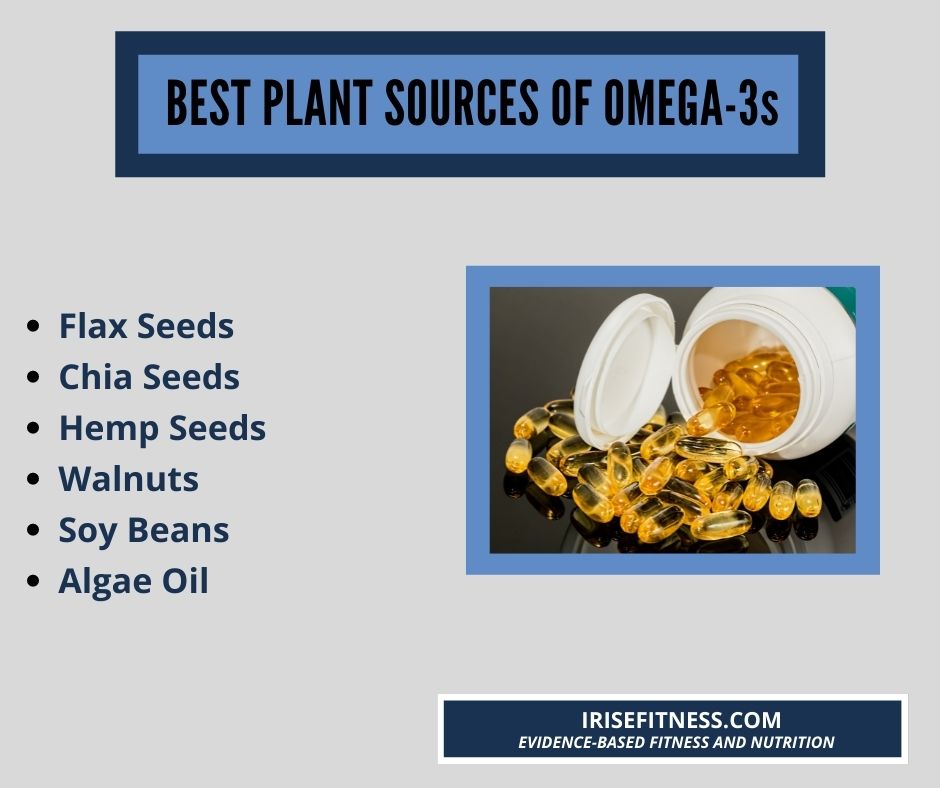
Vitamin D
Importance
Vitamin D is known as the “sunshine” vitamin, aids in the absorption of calcium, helping to maintain strong bones. It also helps maintain normal levels of phosphorus, in addition to supporting our immune function and heart health.
Considering the fact that not many foods contain vitamin D, it is recommended to get 15-20 minutes of sun exposure daily to exposed skin during the summer months.
That said, many of us live in climates that have winter months with limited sunshine, in which case during that time, it is recommended to get your daily dose of vitamin D from either fortified foods, such as plant milks or from a supplement.
How do you get enough vitamin D?
If you are relying on Vitamin D from fortified foods, make sure you check the nutrition facts to ensure you are getting the amount you need.
If you choose to supplement vitamin D, for the average person, I recommend taking between 25-50 mcg/day (1000-2000 IU/day) and for older folks, 100 mcg/day (4000 IU/day) is recommended.
Interestingly, there are some mushrooms that contain a lot of vitamin D because they are exposed to UV light. Just make sure they are advertised to contain vitamin D.
Zinc
Importance
Zinc is a mineral that isn’t talked about much. However, it is very important for your immune system and metabolism function, among other things.
For people who eat meat, the RDI (recommended daily intake) for zinc is 11 mg/day for men and 8mg/day for men. That said, the requirement is slightly higher for people who don’t eat meat, partially because phytic acid, a substance found in many plant foods, reduces the absorption of zinc (despite having anti-cancer effects).
To be safe, men should eat 14-16mg/day and women should eat 12 mg/day.
Research shows that vegans have the about the same zinc levels as vegetarians and slightly lower levels than meat eaters so simply ensuring you eat enough foods containing zinc is important.
What foods are high in zink?
Legumes (beans, chickpeas, lentils) are high in zinc.
- 1 cup of black beans has 1.8mg of zinc, which is 11% for men and 15% for women
- 1 cup of chickpeas has 2.6mg, which is 17% for men and 22% for women
- 1 cup of lentils has 2.6 mg too.
Nuts are another great source of zinc.
- 1 ounce of cashews (160-170 calories) has 1.6mg, which is 10% for men and 13% for women
- Almonds are a bit lower at .9mg per ounce.
Seeds: an ounce of pumpkin seeds contains 2.2 mg. 2 tablespoons of hemp seeds has 2 mg (11% for men, 15% for women).
Oats: 1 cup of oats has 2.9mg, 18% for men, 24% women.
Tofu is high in zinc, with 100 calories containing between 1-1.5mg of zinc.
Fiber
Fiber is a type of carbohydrate that is a plant-based nutrient. It doesn’t function like typical carbohydrates, however, as it cannot be broken down into digestible sugars that the body uses as energy. Instead, it passes through the digestive system without being digested.
There are two types of fiber:
Importance
Insoluble fiber does not dissolve in water prevents constipation and promotes bowel health by attracting water into your stool.
Soluble fiber dissolves in water and helps to control blood sugar levels and cholesterol levels.
Plants have varying levels of soluble and insoluble fiber, which is one reason why eating a wide variety of plant-based foods is optimal for human health.
Fiber is incredibly important for creating normal bowel movements, maintaining proper bowel health, has been shown to reduce your incidence of developing many different chronic diseases, and is strongly linked to longevity.
For example, meta-analysis analyzed 17 studies from 1997 to 2014 that had a total of 67,260 deaths and 982,411 members. Overall, the researchers found a statistically significant inverse association between fiber intake and all-cause mortality. Furthermore, there was a 10% reduction in risk for per each 10-g/day increase in fiber intake.
What foods are high in fiber?
Fiber is only found in plant foods, not animal foods. So as long as you eat lots of plant-based foods, you’ll get plenty of fiber!

Folic Acid
Importance
Folic acid is crucial in promoting healthy cell growth and function. It is crucial during early pregnancy to reduce the risk of birth defects.
What plant-based foods are high in folic acid?
Dark, leafy greens, legumes (beans, peas, lentils) asparagus, beets, citrus fruits, whole grain breads, nutritional yeast, fortified cereals, avocado, nuts and seeds, and more.
Magnesium
Importance
Magnesium is a mineral that plays many important roles in the body, including helping support proper muscle and nerve function, in addition to energy production.
What foods are high in magnesium?
Green leafy vegetables, legumes (tempeh, tofu, beans, chickpeas, peas), nuts (almonds, cashews), seeds (flaxseeds), fortified cereals, whole grains.
Potassium
Importance
Potassium is used in just about every thing your body does, which includes helping your muscles contract, maintaining fluid balance, and maintaining a normal blood pressure.
What foods are high in potassium?
Legumes (beans, chickpeas, lentils, tempeh, tofu), potatoes, squash, avocado, bananas. One cup of lentils/beans has 15-20% of your daily potassium.
Selenium
Importance
Selenium helps the body make DNA and protect against cell damage and infections. It also helps maintain proper reproductive and thyroid function.
It is considered a trace mineral because we don’t need much of it to be healthy.
What foods are high in selenium?
Since selenium is present in soil, most plant-based foods grown in soil contain at least a small amount of selenium. Some foods contain higher levels of selenium, such as Brazil nuts, whole grains, and legumes.
Vitamin A
Importance
Vitamin A is a nutrient important for vision, growth, cell division, reproduction and immunity.
There are two types of Vitamin A: preformed Vitamin A, and provitamin A. Beta-carotene is the most common form of provitamin A, which is found in many different foods.
What foods are high in Vitamin A?
Carrots, sweet potatoes, kale, butternut squash, spinach, red peppers, papaya. One serving of carrots/sweet potato has more vitamin A than you need per day. A serving of spinach has around 95% of your RDA, whereas a serving of Kale has around 35%.
Vitamin B 1, 2, 3, 5, 6, 7
Importance
B Vitamins are crucial for energy production, immune function, and iron absorption.
What foods are high in B vitamins?
· B1, B2 and B3: whole-grains (oatmeal, brown rice, whole wheat bread/pasta), fortified products (bread and cereals)
· B5: nutritional yeast, avocado, potatoes, oats, cereals, tomatoes
· B6: nutritional yeast, fortified cereals, avocado, fortified soy products, chickpeas, potatoes
· B7: tempeh, nuts, fruits
Vitamin C
Importance
Vitamin C is crucial for your immune system, connective tissue and heart and blood vessel health, and more.
It is an antioxidant that helps protect your cells against the effects of free radicals, which are thought to play a significance role in the development of heart disease, cancer, and other diseases.
What foods are high in vitamin C?
Oranges, strawberries, papayas, broccoli, Brussels sprouts, kale, potatoes. One orange provides nearly 80% of the calcium you need each day.
Vitamin E
Importance
Vitamin E is a fat soluble vitamin with the primary role of protecting against free radicals in your body, which are thought to plan an important role in the development of heart disease, cancer, and other diseases.
What foods are high in vitamin E?
Dark leafy greens, nuts, seeds, avocado, red pepper, mango, asparagus, peanuts, peanut butter,
Vitamin K
Importance
Vitamin K is responsible for blood coagulation (blood clotting), the building of strong bones, along with several other important functions.
What foods are high in vitamin K?
Green leafy vegetables (kale, mustard greens, spinach, Brussels sprouts, broccoli, green beans, cabbage, scallions, prunes, avocado, kiwi. One cup of green leafy vegetables contains far more vitamin K than you need per day!
The Bottom Line
The bottom line is that the best way to get all your nutrition is by eating a plant-based diet centered around a variety of plant foods.
Eating a plant-based diet doesn’t make it harder to get your nutrients – in fact, it makes it easier because plants are so nutritionally dense, packed with vitamins and minerals.
That doesn’t mean that you shouldn’t think about it. You should, because any “diet” needs to have some thought behind it. But as I’ve shared in this article, the reality is that if you are eating a variety of plant-based foods throughout the day, you shouldn’t have to worry too much about getting all your vitamins and minerals.
To make your life easier, I have made a daily dozen (inspired by Dr. Michael Greger), that ensures you are appropriately planning your plant-based diet.
Aim to eat the following food groups (and quantities) each day and you should be good!
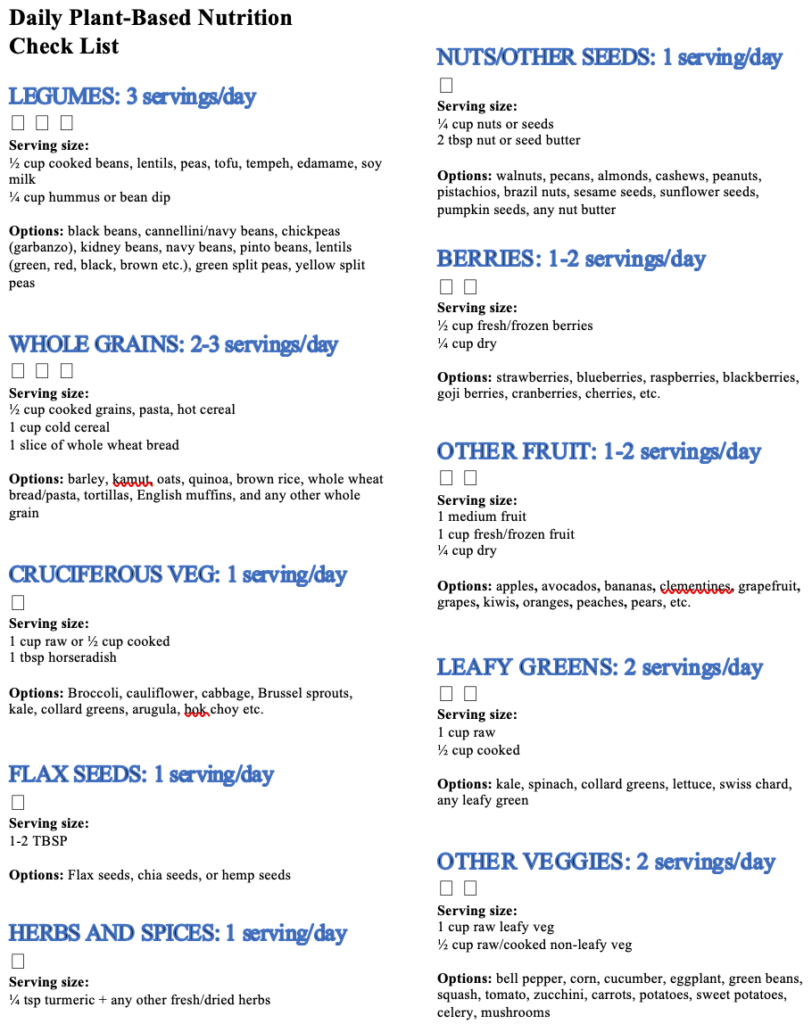
Online Plant-Based Fitness and Nutrition Coaching
So if you are looking for a coach (who understands a plant-based diet) to help keep you accountable and create a plan specifically for you, I recently opened up a few spots for my online fitness and nutrition coaching. Here’s what it includes:
- Customized workout routine that is tailored to your goals based on your schedule/available equipment.
- Tailored plant-based nutrition coaching so you can reach your goals while optimizing your health.
- Integrated support system that allows you to be held accountable throughout your journey.
If you’re interested in working with me so you can reach your fitness and nutrition goals, feel free to reach out as I’d love to talk more about whether we might be a good fit for each other. Find out more here!

